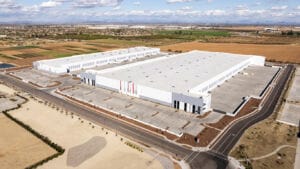When Brad Schenck began his career in 1989, his focus was on building the tangible. His thoughts were on steel, concrete and glass and how they fit together to form a structure that functioned just as the client ordered.
Nearly 30 years later, Schenck is still driven by building, but his focus is more on the “who” than the “what.”
“I would say that at this point in my career, the thing that drives me the most is the people, especially the people here in our office,” said Schenck, the senior vice president of operations for the Southwest Division of JE Dunn Construction. “I’m just surrounded by some really talented, great people. I get a lot of energy seeing them be successful, helping them be successful building and doing what we do down here.”
Schenck is entering his second year as head of the Southwest Division for JE Dunn. Based in Kansas City, Mo., JE Dunn works on construction projects for a wide base of industries, including healthcare, higher education and government. The privately-owned company has 20 offices nationwide and reported $3.2 billion in revenue in 2016.
Schenck’s arrival in the Arizona office has helped it grow from $70 million in revenue in 2017 to projections of more than $100 million in 2018.
“We’ve got good diversity in the kinds of projects we’re working on,” Schenck said. “We’ve picked up some healthcare work, hospitality work and office work. Our revenue is growing.”
Schenck began his career with JE Dunn at the company base in Kansas City, Mo. He started as a field engineer in 1989 after graduating with a construction engineering degree from Iowa State University. Schenck’s interest in construction and engineering was fostered at home. His father was an electrical engineer and his father’s family operated a construction company in Omaha, Neb. Schenck was initially interested in the architecture side of the industry, but didn’t have confidence in his artistic abilities.
“I liked art growing up and architecture and thought maybe there’s an opportunity there,” Schenck said. “When I walked into the architecture building at Iowa State, I was a bit intimidated by all of the art. I’m OK at art, but not an artist, so that kind of scared me away. They directed me over to the construction engineering.
“It was a good blend of the two things; the construction side like my dad’s side of the family in Omaha, and the engineering piece.”
Schenck worked his way up to project manager before moving to Denver in 1998 to work for GE Johnson Construction. He rejoined JE Dunn in its Denver office as a senior project manager in 2001.
In 2006, Schenck was at a career crossroads. He enjoyed his role as an on-site leader, but had an opportunity for promotion as a director of preconstruction, which called for less on-site work and more office time.
“I didn’t want to let go of the field,” Schenck said. “I enjoyed being out there in the trailers, I enjoyed interacting with the foremen and I felt like that was something I knew and was good at.
“Leaving that to go to something I haven’t done before, that was a tough change. I think for me that stressed me a little bit but it was a good change.”
That move propelled Schenck upward in the JE Dunn company, leading him to his current role as division head. For Schenck, the Arizona market has offered a different set of challenges than he faced while working in Denver for 19 years. Schenck said that he feels the region’s construction market is migrating away from a focus on residential building and towards commercial.
“There’s a lot of technology work, a lot of higher ed; you’ve got major campuses around, and with that it brings different types of firms to the market, so you have to evaluate what you’re good at and how that intersects with the market,” said Schenck. “The labor market is really tight down here and it’s in front of mind for everyone that builds in this market.”
Schenck said his focus at this stage of his career is on building a team that can thrive and meet the changing demands of the market.
“When you continue to grow in your career, it’s really about how you motivate others and how you build a high-performing, highly-integrated team and that’s where your role as a coach is,” Schenck said. “That’s the thing that drives me; growing people, helping them in their careers, helping them be successful and watching them be successful. I want them to feel like they are part of growing our team and our office so that in 10 years from now when we’re doing $300 million a year, they can look back and feel they were an important part of building this.”




